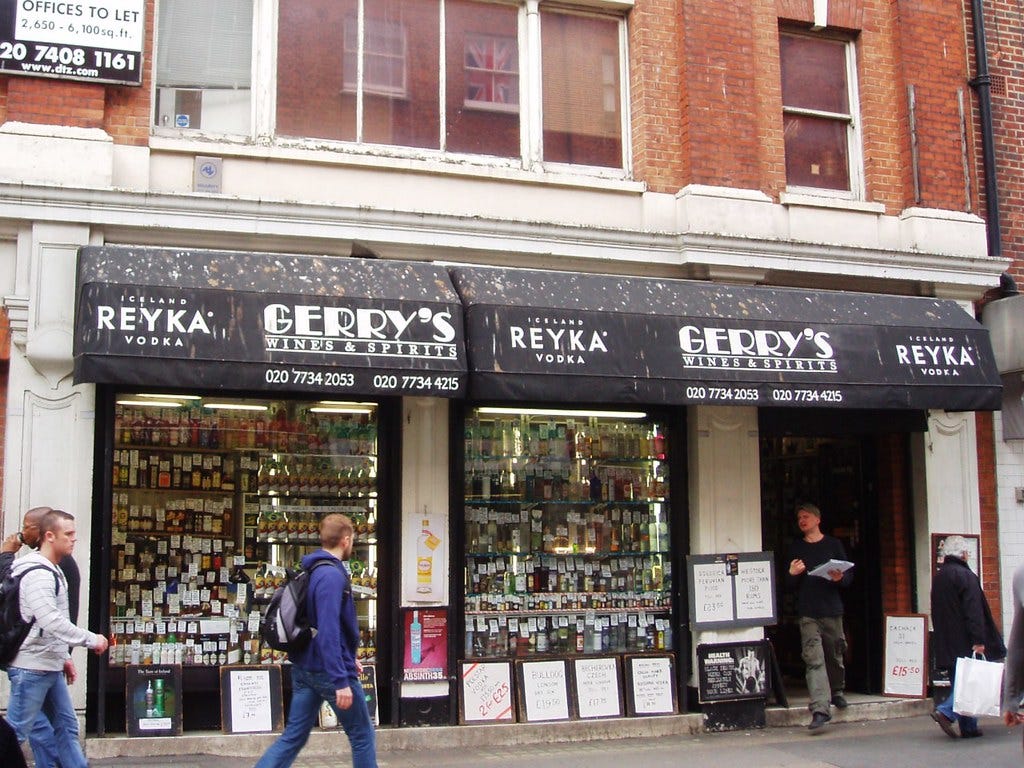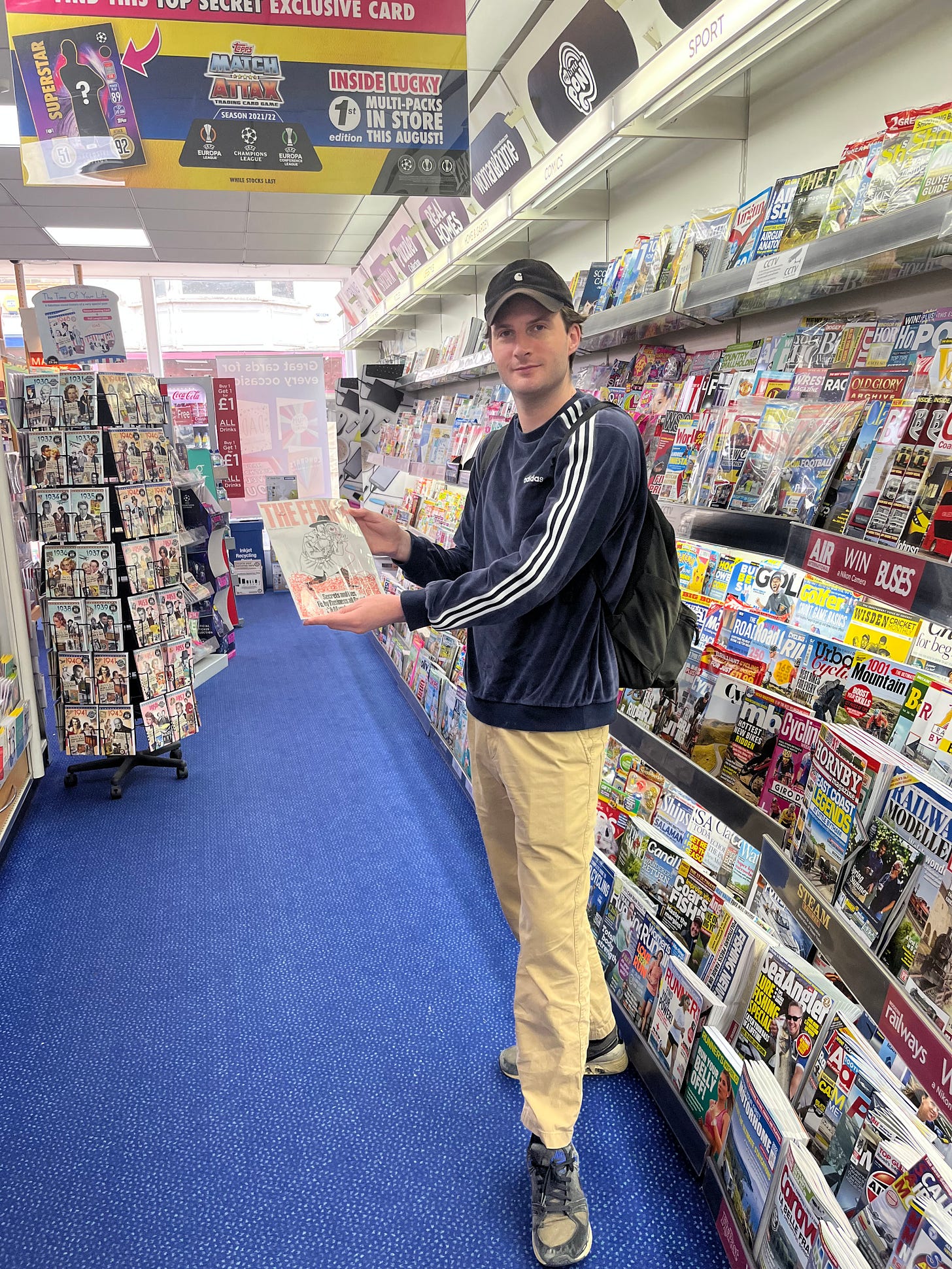Despite running a digital newsletter, we are unashamed fans of hardcopy magazines, especially independent hardcopy magazines that are funny, smart, well-designed and published out of London.
For all those reasons and more we’ve been subscribers to The Fence since we first stumbled across it during lockdown, and it’s probably fair to say that its deft combination of satire, fiction, criticism and investigative reporting has been one of things that has helped keep us sane during the past few years.
In this interview with the magazine’s editor, Charlie Baker, we talk about the state of London’s media industry, whether Soho has been gentrified out of existence or not, and which ‘sketchy London industries’ he’s still looking to investigate.
Can you tell us a little bit about you? Who are you and what’s your relationship to London?
My name is Charlie Baker and I’m the editor of The Fence.
I was born in east London, I live in north London; I spent most of twenties in south London, and I’ve spent far too much time than I would have wished for in west London, so I'd like to think I know the city well, but I increasingly find that I don't.
How would you describe The Fence?
A quarterly print magazine with a weekly newsletter, focused on life in the UK and Ireland, and chiefly inspired by Graydon Carter and Kurt Andersen’s Spy magazine. We do investigations, essays, short stories and comic features, all threaded together with a playful touch.
What made you start the magazine? What was the gap you were trying to fill?
In 2019, it was noticeable that quality publications were increasing their subscriber tally, and that there was also space in the UK market for something humorous in its writing yet rigorous with regards to its journalism, and that there weren’t that many print magazines which represented the interests of younger people.
We also felt that there was space for something that was funny without being scabrous, and that we could make something that would appeal to men and women and across the age brackets and political aisles.
What’s been the hardest thing about establishing a print magazine in London, especially over the past few years?
Compared to, say, the hospitality industry, or at least people who set up a restaurant in February 2020, we weren’t affected too badly. You can make magazines in lockdown. But you need to meet in-person to really commission, edit and write properly.

You have an actual, physical office in Soho now. Why was it important for you to do that and why Soho? Also, do you think Soho is really gentrified beyond repair or is that just boring old fart nonsense?
We have an office on Archer Street, right in the mix of it all. The rent is extraordinarily cheap, so when it came up, it was a bit of no-brainer. It’s great being in Soho because it’s easy for everyone to get to, and also people are happy to meet you around there, and of course, it’s a lot of fun.
I think the ‘Soho is dead'‘ thing is old fart nonsense, I’m afraid. It doesn’t have decent bars and nightclubs any more, but then nowhere in London does. The old character is still very much in force: on Old Compton Street, you’ve got Gerry’s, I Camisa and Algerian Coffee Stores all on one block.
There’s a lot of streetwear shops now, they’ve all mushroomed around Supreme just off Wardour Street, and I really like the way you have these super-contemporary stores next to the sex shops, where you'll see a mottled old man in a raincoat come out with a brown paper bag, next to bunch of teenagers on e-scooters queuing up for the latest drop of £90 t-shirts. It’s a slice of London life.
Other areas in London have had their character completely altered against the wishes of the local residents, and that hasn’t got as much coverage in the press. I’m thinking of the demolition of Elephant and Castle Shopping Centre and the Hondo tower in Brixton in particular here [see this issue for more on Brixton and the tower].
What’s your opinion on the state of print media right now? There’s an argument that what started with blog culture and has continued with newsletters and the ‘zine resurgence has made the need for broader ‘mass media’ titles redundant. But the reaction to the The Fence seems to show that there is a space for what you do that goes far beyond plain old 'nostalgic yearning'.
Yes, I think if you put together a magazine with imagination then people will be interested, but the costs of print media are increasingly prohibitive, and they’ve certainly increased significantly in the last year. Magazines that are beautifully put together and fun to read are a decent alternative to doomscrolling, that’s for sure.
Until The Fence came along the satirical press in the UK seems to have peaked with Private Eye (with maybe The Friday Thing, Popbitch and Gawker getting honorary mentions along the way). Why do you think there’s been such a dearth of independent critical voices (particularly in London) over the past 50 years?
I wouldn’t necessarily agree with that. Viz was selling millions - literally, millions - of copies in the 90s. There was some very good stuff done by Vice a few years back, and I thought the Mushpit was very good, too. And more generally, if you look at most publications today, their star writers are the funny ones, or at least the ones who write with some degree of humour.
How optimistic are you about the state of news media in general? We’ve written a bit recently about how London's local newspapers are now just clickbait machines for large American conglomerates and it’s hard to see it getting better. Can you offer us a ray of light?
There are lots of great new publications, Vittles is just fantastic, the new Face edited by Matthew Whitehouse is really, really good, there's some top journalism being done at the Manchester Mill.
Sadly, though, the overall picture is not rosy: most major publications are largely hostile to younger people, unless they parrot the views of their superiors; there aren't enough staff jobs for graduates to get the experience and confidence they need; the industry doesn't pay that well across the board, which means that not a viable career for large parts of the population, and there’s also an issue about the perception of value in journalism.
For various reasons I won’t bore on about, great swathes of the country expect top quality writing to be free, and resent being asked to pay for it. This is very much not the case in America, which is why it has a much more diverse and buoyant small magazine scene.
The Fence has a great line in ‘insider tell-alls’ across everything from Russell Brand’s PR to the SAS. Are there any insiders that are on your wishlist that you haven’t managed to snag yet?
I would love to have something from a sports agent or a criminal barrister. A fashion designer would be good, too.
We've done quite a bit of stuff on the Church of England but I would like to cover other religions in London better - it's a fascinating story how London has become more religious in the 21st century as the rest of the country has become more atheist.
The one nut that is nearly impossible to crack is the art advisor - which is this sketchy industry that has blossomed in London in the last 20 years. But none of them will talk to journalists.
Best pub in walking distance of the Fence office?
The Lyric is very close to the office, and that's the one we go to.
Best restaurant if someone else is picking up the bill?
Best restaurant if you’re picking up the bill?
Andrew Edmunds.
The London institution that you would hate to see disappear?
I'm going to go for: Andrew Edmunds.
Some of our favourite Fence articles (that you can read online):
From their ‘Worst in London’ series: The Worst bar in London and The Worst Tesco in London.
London Coffee Shops as Failed Dating Experiences (“She arrives in a blur of coat layers. She tells you five minutes in that she identifies as a Hufflepuff.”), and London Train Stations as Serial Killers (“Paddington is like John Wayne Gacy, the infamous killer-clown”).
In the Beginning was the Blurb, an investigation into the phenomenon of the literary blurb (featuring previous LiB interviewee, Will Wiles).
Almost Famous, music journalist Joe Muggs on what happened after he met singer-songwriter Joel Culpepper at the nursery school gates.
Follow The Fence on Instagram and on Twitter
You can subscribe to The Fence here, and sign up for their tremendous weekly newsletter.







Well done piece. Thanks for noting Soho's place in the sun. I lived in London in the mid 1960s and remember fondly Charlie Chester's casino, where I spent many a late night/early morning. Also fondly recall the oddball strip clubs whose myriad fronts all led down the back alley to the same unspectacular "theatre" where a not-so-lovely lady would stand on stage, backed up by canned music scratching out of a really bad sound system, and ever-so-slowly remove a number of garments before shuttling off. Anyway, thanks again. I've always had a soft spot for Soho.